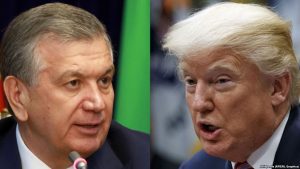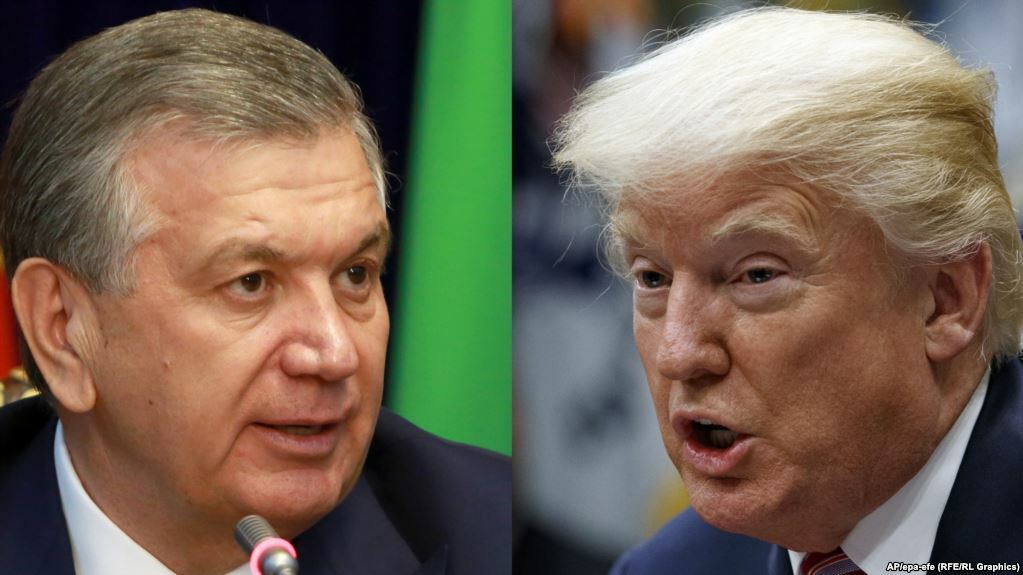2018-01-26 By Richard Weitz
Remarkable changes are occurring in the heart of Eurasia—specifically in Uzbekistan.
Shavkat Mirziyoyev, who became president a year ago, after serving as prime minister with previous President Islam Karimov for more than a dozen years, has launched a new foreign policy course.
While still prioritizing the pursuit of national autonomy, the Mirziyoyev administration has launched novel initiatives to secure business deals, raise the country’s diplomatic stature, and bolster Uzbekistan’s national security in cooperation with other countries and international organizations,
One driver of this new course is that Uzbekistan pursues greater integration with neighboring states to leverage its natural assets as the region’s most populous and centrally located country.
Uzbekistan uniquely borders all other Central Asian states as well as Afghanistan—but does not have frontiers with Russia or China due to intermediary buffer states.
In the last year, the new government has taken a comprehensive approach toward improving political, security, economic and cultural ties with bordering states.
Besides prominent reciprocal presidential visits and summits, broadened neighborly ties have extended to encompass regional authorities and nongovernmental actors.
Uzbekistani officials have assumed a more conciliatory approach to many regional issues like water management, energy sharing, cross-border travel, and border demarcation. They have stressed the need for greater multinational cooperation to address these common transnational issues.
Moreover, the authorities now supplement their traditionally strict internal controls against extremism with novel reform measures. These measures include promoting enlightened Islam, removing the number of blacklisted terrorist suspects, and limiting the security agencies.
The government also pursues deeper international anti-terrorism partnerships, both bilaterally and within the scope of the Shanghai Cooperation Organization (SCO).
The ethnic Uzbeks involved in the recent terrorist incidents in Russia, Europe, and the United States left Uzbekistan many years ago. Meanwhile, few major terrorist incidents have occurred within the country in recent years.
While the prior administration closed and fortified (including using landmines) the country’s frontiers to prevent terrorist infiltration, Uzbekistan is now easing entry restrictions to achieve economic and political gains. The new government has also signed defense cooperation agreements with Turkey, Russia, and several other countries.
In terms of specific bilateral partnerships, economic, diplomatic, and security exchanges with each Central Asian neighbor have grown.
In the case of Kyrgyzstan, the two states have delineated most of their previously disputed 1300-km border, expanded cross-border trade and tourism, and mitigated their conflict over shared water bodies.
Uzbekistan, which uses regional water supplies mainly for irrigation, has also downplayed its opposition to Tajikistan’s hydropower projects and ended punitive restrictions on Tajikistan’s foreign economic ties. The two governments have announced they will reduce mutual visa requirements and expand bilateral trade and travel.

Mirziyoyev chose Turkmenistan for his first official foreign visit as president. Uzbekistan and Turkmenistan representatives have discussed new energy projects such as the proposed Turkmenistan-Uzbekistan-Tajikistan-Afghanistan-Pakistan project and the Turkmenistan-Afghanistan-Pakistan-India natural gas pipeline.
Although relations with Kazakhstan have changed less than with other partners, this stability has been an achievement since the two countries have at times competed for regional primacy. Though Uzbekistan has a bigger population, Kazakhstan has a larger economy and, until recently, a more prominent diplomatic profile.
Uzbekistan has launched a new approach to Afghanistan.
Uzbekistani officials now describe the country as a regional partner rather than threat. The Mirziyoyev administration has appointed a special envoy to the country, is building new bilateral and regional transportation links encompassing Afghanistan, and has established a bilateral security commission to supplement regional security initiatives.
Even beyond Central Asia, Uzbekistan has taken steps to improve its foreign economic relations.
The national development strategy for 2017-2021 sets the goals of enhancing Uzbekistan’s macroeconomic stability, economic competitiveness, business investment environment, and international cooperation.
Recent initiatives toward these ends include:
- Diversifying exports beyond raw materials to include industrial and high-technology goods
- Using energy and water more efficiently
- Modernizing the national energy grid through greater use of renewable sources
- Relaxing restrictions on foreign currency transactions
- Encouraging inward foreign investment and tourism, and
- Striving to transform Uzbekistan from a land-locked country to a Eurasian transit hub.
Despite many departures from the former administration’s policies, Uzbekistan continues to pursue balanced ties with the great powers.
Uzbekistan still rejects military alliances, foreign bases, or extraterritorial deployment of Uzbek soldiers.
Relations with NATO remain limited, while the government insists it will not join Moscow-dominated regional institutions, such as the Collective Security Treaty Organization or the Eurasian Economic Union.
Russia and China remain Uzbekistan’s largest trading partners. Though trade with Russia is greater, Uzbekistan sees Beijing’s Belt and Road Initiative as a rare opportunity to secure massive foreign loans and infrastructure investment.
Tashkent’s new foreign-policy course offers Washington opportunities.
Policy makers in Tashkent seek continued U.S. support and partnership to help balance Russian military power, China’s rising economic presence, and uncertainties regarding Iran and Afghanistan.
Uzbekistani and U.S. officials, including Presidents Mirziyoyev and Trump, have pursued commercial deals and cooperation regarding Afghanistan and regional terrorism.
U.S. Special Forces have been training hundreds of Uzbekistani Special Forces, while U.S. Central Command has applauded Uzbekistan’s new course as “a promising development given Uzbekistan’s central and strategic geographic location, in the heart of Central Asia and bordering Afghanistan.”
According to CENTCOM, “bilateral mil-to-mil efforts are focused on helping the Uzbeks improve border security, enhance their counter-narcotic and counter-terrorism capabilities, and prevent the return of foreign fighters into the country…We also are helping the Uzbek military, which is the largest military in Central Asia, to professionalize its forces through advisory support and assistance to its professional military institutions.”
The United States can also help Uzbekistan deal with such major challenges as international terrorism emanating primarily from Afghanistan, unresolved border and water access disputes, and underdeveloped regional transport and logistic networks.
Still, Washington needs a steady but determined hand to sustain a positive and prominent regional role in coming years.


